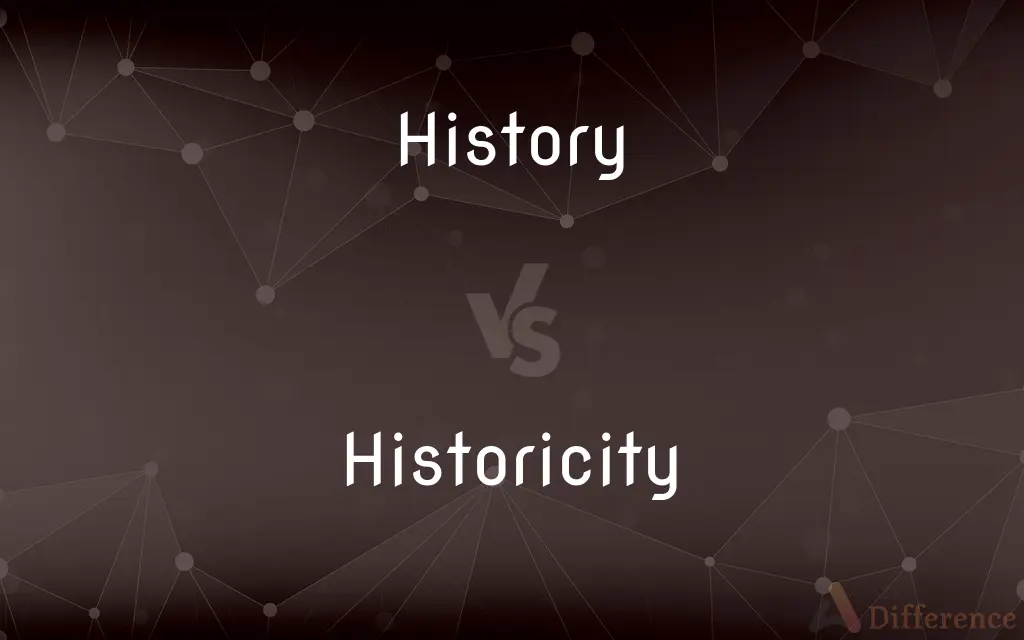History vs. Historicity — What's the Difference?
By Urooj Arif & Fiza Rafique — Updated on May 2, 2024
History refers to the study of past events, while historicity concerns the authenticity and accuracy of historical accounts or events.

Difference Between History and Historicity
Table of Contents
ADVERTISEMENT
Key Differences
History involves researching, studying, and interpreting past events as they are understood through sources like documents, artifacts, and testimonies. Whereas, historicity is a measure of how accurately these historical narratives represent what actually occurred.
Historians compile history from a variety of sources to create narratives and analyses of past societies, events, and cultures. On the other hand, the concept of historicity involves critically assessing the reliability and factual basis of these historical descriptions.
History can be presented in many forms, including books, lectures, and documentaries, focusing on a broad overview of past events. In contrast, discussions of historicity often occur in academic or scholarly contexts, where the validity of historical claims is scrutinized.
The study of history is essential for understanding the context and development of human civilizations. Conversely, evaluating historicity is crucial for ensuring that historical scholarship is based on truthful and accurate information.
While history is about learning what happened in the past, historicity involves determining if what is recorded or believed truly reflects those past realities or if it has been altered by biases, errors, or incomplete records.
ADVERTISEMENT
Comparison Chart
Definition
The study of past events.
The accuracy and authenticity of historical accounts.
Focus
Broad narratives of past events.
Critical evaluation of historical evidence.
Usage
Educational, informational.
Academic, scholarly.
Outcome
Understanding of past societies.
Assessment of historical truthfulness.
Key Considerations
Source collection, narrative construction.
Source reliability, factual accuracy.
Compare with Definitions
History
Can be specialized into various branches like military, cultural, or economic history.
Her research focuses on the economic history of South Asia.
Historicity
Crucial for validating historical narratives.
His book challenges the historicity of traditional accounts of the conquest.
History
Often taught as a school subject.
Students typically learn American history in middle school.
Historicity
Historicity assesses the factual accuracy of historical records.
The historicity of ancient legends is often debated by scholars.
History
History is the chronological record of past events.
He teaches European history at the university.
Historicity
Requires a deep understanding of historiography.
Studying historicity involves analyzing how history has been written and interpreted.
History
Focuses on the sequence and impact of events.
The history book covers the major wars of the 20th century.
Historicity
Involves scrutinizing source authenticity.
Archaeologists contribute to understanding the historicity of artifacts.
History
Involves interpreting the past based on diverse sources.
Historians use both primary and secondary sources to write history.
Historicity
Can be a contentious issue in interpreting history.
Discussions about the historicity of biblical events can be controversial.
History
History (from Greek ἱστορία, historia, meaning "inquiry; knowledge acquired by investigation") is the study of the past. Events before the invention of writing systems are considered prehistory.
Historicity
Historicity is the historical actuality of persons and events, meaning the quality of being part of history instead of being a historical myth, legend, or fiction. The historicity of a claim about the past is its factual status.
History
A chronological record of events, as of the life or development of a people or institution, often including an explanation of or commentary on those events
A history of the Vikings.
Historicity
Historical authenticity; fact.
History
A formal written account of related natural phenomena
A history of volcanoes.
Historicity
Historical quality or authenticity based on fact.
The historicity of minor political figures of this period is often hard to establish due to a dearth of sources.
This particular school places great emphasis on the historicity of ideas, practices, or institutions.
History
A record of a patient's general medical background
Took the patient's history.
History
An established condition or pattern of behavior
An inmate with a history of mental illness and drug abuse.
History
The branch of knowledge that records and analyzes past events
"History has a long-range perspective" (Elizabeth Gurley Flynn).
History
The past events relating to a particular thing
The history of their rivalry is full of intrigue.
History
The aggregate of past events or human affairs
Basic tools used throughout history.
History
An interesting past
A house with history.
History
Something that belongs to the past
Their troubles are history now.
History
(Slang) One that is no longer worth consideration
Why should we worry about him? He's history!.
History
A drama based on historical events
The histories of Shakespeare.
History
The aggregate of past events.
History repeats itself if we don’t learn from its mistakes.
History
The branch of knowledge that studies the past; the assessment of notable events.
He teaches history at the university.
History will not look kindly on these tyrants.
He dreams of an invention that will make history.
History
The portion of the past that is known and recorded by this field of study, as opposed to all earlier and unknown times that preceded it (prehistory).
In all of human history and prehistory
In all recorded history
History
(countable) A set of events involving an entity.
What is your medical history?
The family's history includes events best forgotten.
A long and sordid history
History
(countable) A record or narrative description of past events.
I really enjoyed Shakespeare's tragedies more than his histories.
A short history of post-Columbian colonization
History
A list of past and continuing medical conditions of an individual or family.
A personal medical history is required for the insurance policy.
He has a history of cancer in his family.
This diagnosis is usually based solely on the history and physical examination, although laboratory tests are occasionally also obtained.
History
A record of previous user events, especially of visited web pages in a browser.
I visited a great site yesterday but forgot the URL. Luckily, I didn't clear my history.
History
(informal) Something that no longer exists or is no longer relevant.
I told him that if he doesn't get his act together, he's history.
History
(uncountable) Shared experience or interaction.
There is too much history between them for them to split up now.
He has had a lot of history with the police.
History
(obsolete) To narrate or record.
History
A learning or knowing by inquiry; the knowledge of facts and events, so obtained; hence, a formal statement of such information; a narrative; a description; a written record; as, the history of a patient's case; the history of a legislative bill.
History
A systematic, written account of events, particularly of those affecting a nation, institution, science, or art, and usually connected with a philosophical explanation of their causes; a true story, as distinguished from a romance; - distinguished also from annals, which relate simply the facts and events of each year, in strict chronological order; from biography, which is the record of an individual's life; and from memoir, which is history composed from personal experience, observation, and memory.
Histories are as perfect as the historian is wise, and is gifted with an eye and a soul.
For aught that I could ever read,Could ever hear by tale or history.
What histories of toil could I declare!
Justly Cæsar scorns the poet's lays;It is to history he trusts for praise.
No more yet of this;For 't is a chronicle of day by day,Not a relation for a breakfast.
Many glorious examples in the annals of our religion.
History
To narrate or record.
History
The aggregate of past events;
A critical time in the school's history
History
The continuum of events occurring in succession leading from the past to the present and even into the future;
All of human history
History
A record or narrative description of past events;
A history of France
He gave an inaccurate account of the plot to kill the president
The story of exposure to lead
History
The discipline that records and interprets past events involving human beings;
He teaches Medieval history
History takes the long view
History
All that is remembered of the past as preserved in writing; a body of knowledge;
The dawn of recorded history
From the beginning of history
Common Curiosities
How does one study history effectively?
Studying history effectively involves analyzing a wide range of sources, understanding different perspectives, and recognizing the context in which events occurred.
Can history be unbiased?
While historians strive for objectivity, complete impartiality is challenging due to the inherent subjectivity of source interpretation and selection.
What is the main difference between history and historicity?
History is the study of past events, while historicity is concerned with the truthfulness and accuracy of those historical accounts.
What tools do historians use to determine historicity?
Historians use tools such as source criticism, comparative analysis, and cross-referencing with archaeological findings to assess historicity.
How can understanding historicity affect modern society?
Understanding historicity can help modern societies more accurately interpret their histories and avoid repeating past mistakes, fostering a more informed citizenry.
Are there historical periods where historicity is more difficult to ascertain?
Yes, historicity is often harder to ascertain for ancient or poorly documented periods where sources are scarce or highly fragmented.
How do misconceptions about historicity arise?
Misconceptions about historicity can arise from the misinterpretation of sources, reliance on outdated scholarship, or popular myths perpetuated through media.
What role does historicity play in legal or political contexts?
In legal or political contexts, historicity can play a critical role in land claims, treaty interpretations, and the justification of rights or policies based on historical precedents.
Why is historicity important in historical studies?
Historicity ensures that historical writings are based on factual, accurate information rather than on myths or biases.
What impact does the question of historicity have on public perception of history?
Questions of historicity can influence public perception by challenging accepted narratives and encouraging a more critical engagement with history.
Share Your Discovery

Previous Comparison
Chennai vs. Madras
Next Comparison
Construction vs. ReconstructionAuthor Spotlight
Written by
Urooj ArifUrooj is a skilled content writer at Ask Difference, known for her exceptional ability to simplify complex topics into engaging and informative content. With a passion for research and a flair for clear, concise writing, she consistently delivers articles that resonate with our diverse audience.
Co-written by
Fiza RafiqueFiza Rafique is a skilled content writer at AskDifference.com, where she meticulously refines and enhances written pieces. Drawing from her vast editorial expertise, Fiza ensures clarity, accuracy, and precision in every article. Passionate about language, she continually seeks to elevate the quality of content for readers worldwide.
















































